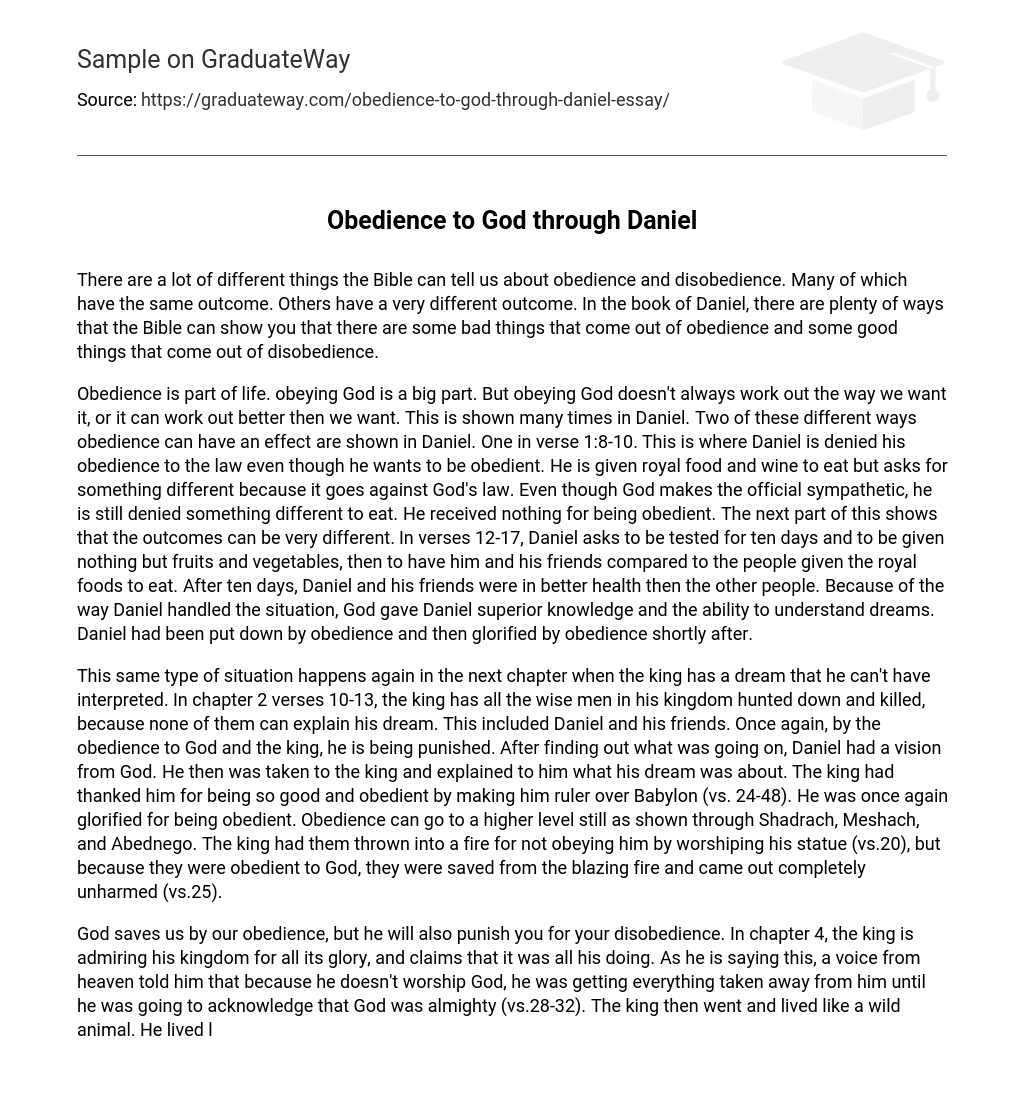The Bible offers various insights on obedience and disobedience, revealing both similar and contrasting consequences. In the book of Daniel, examples abound wherein obedience brings forth negative outcomes, while disobedience yields positive outcomes.
The book of Daniel exemplifies the significant aspect of life which is obeying God. However, the desired outcome is not always achieved by obedience and can even be exceeded at times. The effects of obedience are illustrated in two instances within Daniel. One such example can be found in verse 1:8-10 where despite Daniel’s willingness to comply, his obedience to God’s law is hindered. He declines royal food and wine due to its violation of God’s law but his request is denied by sympathetic officials resulting in no reward for his obedience. Conversely, another part highlights that outcomes can vary significantly. In verses 12-17, Daniel suggests a ten-day test where he only consumes fruits and vegetables and then compares himself with those who consumed royal food. After the allotted time, it is found that Daniel and his friends have superior health compared to others. As a result of Daniel’s wise handling of the situation, God grants him superior knowledge and dream interpretation abilities. Therefore, through obedience, Daniel experiences both disappointment and glorification.
The next chapter contains a similar situation where the king cannot interpret his dream. In chapter 2 verses 10-13, the king hunts down and kills all the wise men in his kingdom, including Daniel and his friends, as no one can explain his dream. Despite being obedient to God and the king, Daniel faces punishment. After receiving a vision from God, Daniel explains the dream to the king. The king rewards him by making him ruler over Babylon and expresses gratitude for his obedience (vs. 24-48). Obedience is further demonstrated by Shadrach, Meshach, and Abednego. The king throws them into a fire for disobeying him by refusing to worship his statue (vs. 20). However, because they are obedient to God, they miraculously survive the fire unscathed (vs. 25).
God saves us through obedience, but disobedience will be punished. In chapter 4, the king boasts about his kingdom’s glory, claiming it as his own achievement. However, a heavenly voice interjects, declaring that the king’s lack of worship for God will result in the loss of everything until he acknowledges God’s supreme power (vs.28-32). Consequently, the king lives like a wild animal for a period of time until he finally admits that God reigns over all (vs. 33-34). Through obedience to God, the king is eventually fully restored to sanity and his royal position.
Another example that supports this point is the story of Daniel’s encounter with the lion’s den. The administrators and satraps ruling alongside Daniel in the kingdom became extremely jealous of his esteemed position. Envious, they conspired to arrest and execute him, but they couldn’t find any valid reasons for his arrest. So, they convinced the king to issue a decree stating that anyone who didn’t worship him for the next 30 days would be thrown into the lion’s den (6:1-11). Despite the danger, Daniel remained loyal to God and defied this decree. Although the king considered Daniel a friend and tried to save him, he had no authority to revoke his own decree. Consequently, Daniel was cast into the lion’s den but emerged unharmed due to his unwavering obedience towards God. It was God who protected him from harm.
The Bible contains numerous stories that demonstrate the value of obedience. Immediate rewards from God for obedience are not always guaranteed; in fact, one may even face punishment from humans for it. Despite potentially defying earthly rulers, ultimately, God will always bestow rewards and grant eternal life to those who remain obedient.
The NIV version of the Bible





